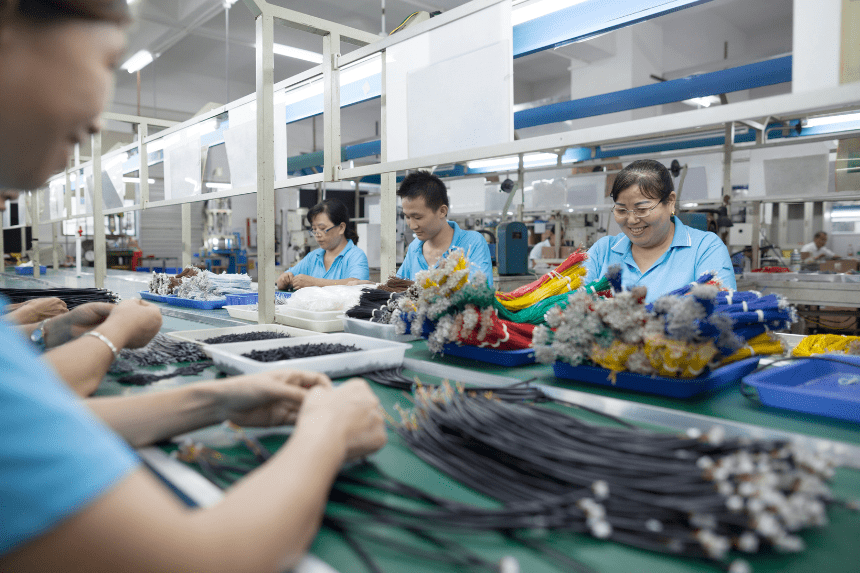The US-China Trade War Impact has fundamentally changed Foshan’s manufacturing sector, a major center in southern China, well-known for manufacturing consumer electronics and household appliances. Starting with taxes on Chinese imports to the US, this trade battle seriously disrupted the supply chain and manufacturing cycles. Once running at full capacity, many manufacturers have seen declining orders, halted production lines, and financial instability. Along with factory owners, these developments have impacted the thousands of people depending on this employment.
- How has the US-China Trade War changed the manufacturing scene in Foshan?
- Why Are Foshan Companies Looking for Diversity of Markets?
- What effects, both social and financial, of the US-China Trade War Impact in Foshan?
- How Can Companies React to the Trade War Impact Between the US and China?
- For Foshan and Global Trade, What Future Does Hold?
A temporary trade ceasefire has helped somewhat in recent months, enabling companies to carefully start activities and mend customer connections. Still, many difficulties arise when tariffs affect worldwide supply chains and cross-border trade. Businesses and investors who want to properly negotiate this changing economic terrain must first understand the US-China Trade War Impact.
How has the US-China Trade War changed the manufacturing scene in Foshan?
The manufacturing sector of Foshan has directly suffered from rising US government tariffs. Tariffs on Chinese goods arriving in US markets occasionally topped 145%. Many businesses were compelled to stop operations momentarily or drastically cut output due to this unexpected cost rise. Entrepreneur focused on smart air fryers, Derek Wang said how first his US clients were amazed by the creative products—devices run under cellphones capable of baking, roasting, and grilling. When tariffs peaked, though, his customers asked for a production stop.
The tariffs strike like a Tsunami, Wang remembered. “Our manufacturing floors almost overnight went empty.”
This experience captures a larger reality across Foshan, where firms deal with declining demand from important export markets and rising running expenses. Businesses today have to rethink their supply chains, pricing, and market approaches. The US-China Trade War Impact has pushed corporations to go outside conventional markets and sped changes in company structures. Read another article on the US-China Trade War
Why Are Foshan Companies Looking for Diversity of Markets?
The drive by Chinese manufacturers to broaden their markets has been among the most noteworthy reactions to the US-China Trade War Impact. Companies are aggressively reaching into developing markets in Africa, South America, and Southeast Asia while the US trade policy remains unknown. Government encouragement helps to push this change in part, as does need.
Derek Wang finds this diversification to be a benefit. “Chinese people say: good fortune comes out of bad,” he remarked. Driven to cut US dependency, his business has looked at foreign sales channels and joint ventures. This approach helps to offset political unrest or potential tariff adjustments.
Other Foshan firms share a similar view. Many are expanding their consumer base, creating goods catered to local requirements, and funding new transport routes. Although the US market is still significant, one of the main survival strategies is currently cutting reliance on it.
What effects, both social and financial, of the US-China Trade War Impact in Foshan?
Beyond factories and boardrooms, the US-China Trade War has had a profound impact on workers and local communities. Known as the “capital of home appliances,” Foshan’s Shunde district has seen layoffs and hiring freezes resulting from financial strain. Many US-connected manufacturers have either partially closed their lines or delayed output.
Many of the workers travel hundreds of kilometers from rural areas and suffer financially. To cut costs, some find themselves sleeping in nearby parks or cheap hostels. These demanding circumstances draw attention to the human cost of trade conflicts.
Life in Foshan goes on despite these difficulties. Employees meet in parks to relax and engage in line dancing or basketball games. Some respite from financial uncertainty comes from these social events.
Running Gongyuan Furniture, business owners like He Ke admit the challenges but remain cautiously optimistic. “People have grown more cautious with their expenditure; the global economy is not good,” he observed. “But we think improved times can result from communication between China and the US.”
How Can Companies React to the Trade War Impact Between the US and China?
Reacting aggressively to the US-China Trade War Impact is crucial for businesses running in Foshan and beyond. This means adopting numerous strategic methods. By spreading their exports to other countries, businesses can lower their risk from unexpected tariff changes and seize expanding consumer goods demand in developing economies. Reducing needless costs and optimizing production helps to improve operational efficiency, therefore absorbing tariff expenses without compromising competitiveness. Open lines of contact with customers regarding tariff effects help companies to keep good ties with them and distribute expenses fairly. Moreover, keeping updated on legislative changes helps businesses to react fast, such as by moving manufacturing to tariff-exempt nations or areas. Other revenue sources can also come from investing in innovation and creating original goods catered to non-US markets.
The latest 90-day trade truce between China and the US provides a crucial gap for companies to bring operations back under control. Companies have to develop resilience and agility, though, to be ready for ongoing uncertainty.
For Foshan and Global Trade, What Future Does Hold?
The immediate US-China Trade War Impact has taxed Foshan’s manufacturers and employees, but it has also spurred strategic changes with long-term advantages. Companies that adjust to business diversification, creativity, and efficiency will be more suited to flourish.
Furthermore, the trade war has revealed weaknesses in world supply networks, which forces nations and businesses to reconsider their suppliers. Though it is still a major manufacturing hub, Foshan has to change with the times in terms of geopolitics and economy.
The trade discussions’ result will define the business landscape in the next months. Still, the lessons gained from this era will shape Chinese firms’ approach to worldwide markets for years to come, independent of political changes.








